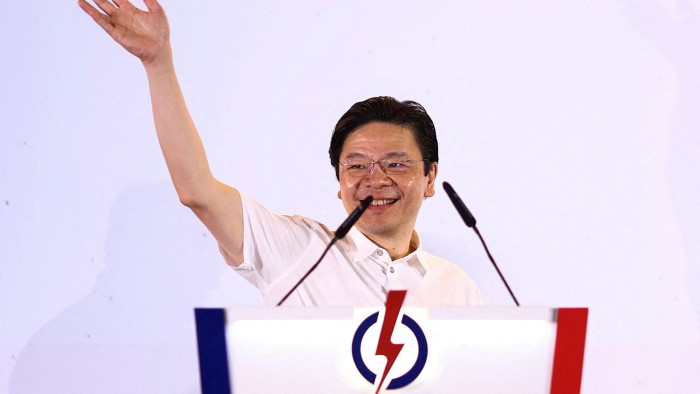Unlock the Editor’s Digest for free
Roula Khalaf, Editor of the FT, selects her favourite stories in this weekly newsletter.
Singapore’s People’s Action party has won its 16th consecutive election, increasing its share of the popular vote as voters in the trade-dependent country backed stability in the face of rising geopolitical tensions.
The PAP — whose winning streak dates back to 1959 when Singapore was a British colony — secured 87 out of 97 seats, including five uncontested seats, according to results announced in the early hours of Sunday morning.
In its first electoral contest under Prime Minister Lawrence Wong, who was elevated to the role a year ago, the party received 66 per cent of the popular vote, higher than 61 per cent in the last election in 2020 and its highest margin of victory in a decade.
More than 92 per cent of the 2.6mn registered electors voted in Saturday’s poll, according to the city-state’s elections department, down from 96 per cent five years ago.
This year’s election came amid an escalating global trade war sparked by US President Donald Trump’s trade war, and echoed recent polls in Canada and Australia, where the incumbent performed well in the face of mounting geopolitical uncertainty.
Singapore’s global trade is greater than three times its GDP, and the financial and commercial hub — which plays a crucial role in the exchange of goods and services between China and the west — is seen as especially vulnerable to a downturn in global trade.
“The results will put Singapore in a better position to face this turbulent world,” said Wong during a speech at 3am. He called the election result a “clear signal of trust, stability and confidence”.
The election was viewed as a crucial test for 52-year-old Wong and the PAP as it looks to a future beyond the country’s founding Lee dynasty, which has dominated Singaporean politics for the past seven decades and oversaw the city-state’s transformation from a developing nation into one of the richest in the world.
Wong took over from Lee Hsien Loong, the son of the country’s modern founder, Lee Kuan Yew. Lee Hsien Loong, who retains an influential advisory role within the government, had run the country for 20 years.
But he will have to grapple with rising costs of living that have put pressure on the city-state of 6mn, whose reliance on imports makes it particularly vulnerable to supply chain disruption and higher inflation.
Singapore has cut its growth forecast for the year from 1-3 per cent to 0-2 per cent on the prospect of a disruption to global trade and warned of a possible recession.
US secretary of state Marco Rubio congratulated Wong and the PAP on their victory. “For nearly 60 years, the United States and Singapore have shared a strong and enduring strategic partnership and a commitment to a secure, free, and prosperous Indo-Pacific region,” he said.
The Workers’ party, the main opposition group, won the 10 seats not taken by the PAP, the same number it won five years ago. It will receive an additional two so-called non-constituency seats due to how close it ran to the PAP in some constituencies.
Pritam Singh, leader of the Workers’ party, acknowledged it had been a tough campaign. Prior to the poll, he had been found guilty of lying to parliament, a case he is contesting.
“The slate is wiped clean, we start work again tomorrow, and we go again,” he said.
Read the full article here
